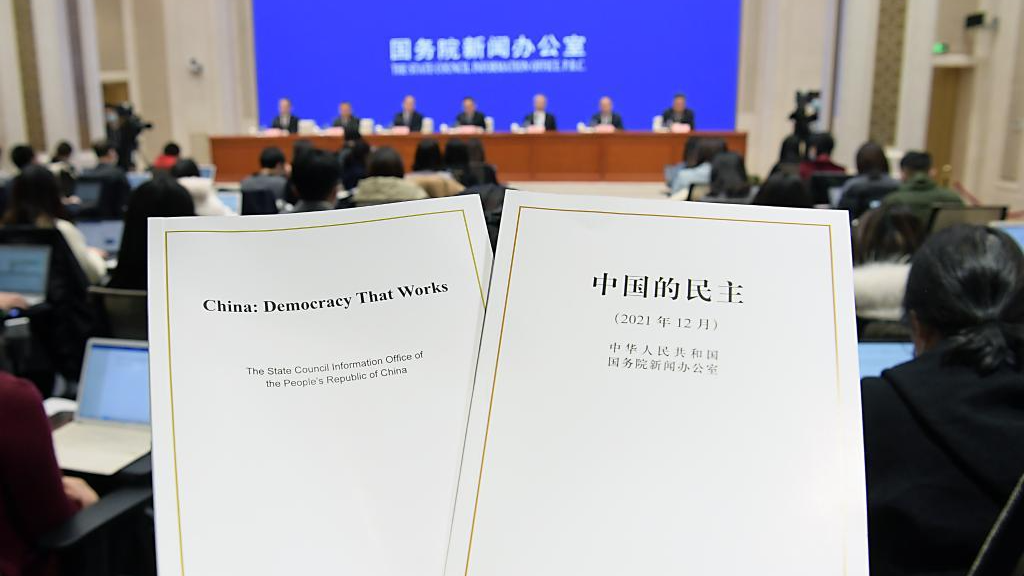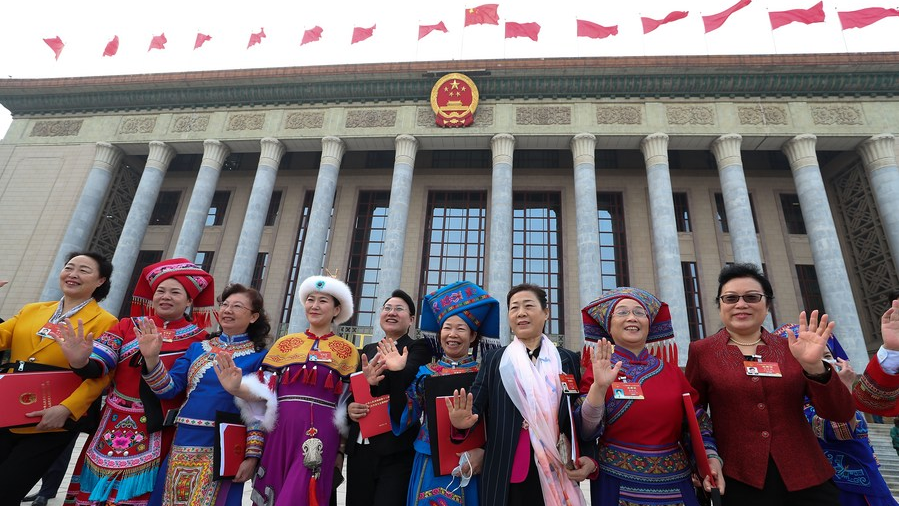
The Chinese- and English-version white paper "China: Democracy That Works" showcased at a press conference held by the State Council Information Office in Beijing, capital of China, December 4, 2021. /Xinhua
The Chinese- and English-version white paper "China: Democracy That Works" showcased at a press conference held by the State Council Information Office in Beijing, capital of China, December 4, 2021. /Xinhua
Editor's note: Stephen Ndegwa is a Nairobi-based communication expert, lecturer-scholar at the United States International University-Africa, author and international affairs columnist. The article reflects the author's opinions and not necessarily the views of CGTN.
For many years, the world has been fed with a unilateral view of democracy. The narrative has been based on notions that true democracy can only come from the West, which has for long assigned itself the role of "civilizing" other societies.
The champion of Western liberal democracy is, of course, the United States. The U.S. has wielded the carrot and stick approach in its perennial quest to democratize other countries, setting conditions for those who wish to relate closely with it. Fortunately for hapless countries, this coercion is gradually backfiring because of the gross interference of the U.S. in other countries' internal affairs and the crumbling of democracy in the U.S. as well.
These cracks were exposed by former U.S. President Donald Trump whose four-year term was laden with drama, as he ran roughshod over the country's democratic structures and institutions. The January 6 Capitol attack was a watershed moment for the country's democratic evolution after Trump allegedly incited his followers to run over the hallowed grounds of the U.S. Capitol, which is viewed as the citadel of democracy in the world.
Indeed, the folly of liberal democracy as espoused by the West is now becoming evident. Western countries are falling by their own sword, with increasing social and economic vices threatening the countries with implosion. The licentious freedom particularly in the West has plagued the superpower with endemic vices, including gun violence, violent crime and drug addiction among the youth.
However, countries like China have disabused the West of the notion that its democracy is a one-size-fits-all system where everybody must play ball. On December 4, the country released a white paper, titled "China: Democracy That Works," describing its own version of democracy.
Basically, the white paper extols the virtues of democratic leadership under the Communist Party of China (CPC)'s concept of "whole-process people's democracy." This is built on what the white paper calls "political civilization" that dates back five millennia. It has been an uphill task as the country struggled with feudal autocracy and semi-colonialism.
According to the white paper, whole-process people's democracy entails undertaking institutional procedures through a 360-degree process. It states that these well-coordinated and comprehensive institutional procedures serve to put into place diverse, open and well-organized democratic channels to ensure that the Party's policies and the state are integrated with the people's aspirations, and that the people are masters of the country.
Interestingly, after the 1911 revolution, the Chinese also experimented with Western political systems – parliamentary, multiparty and presidential – which ended in phenomenal failure. Subsequent revolutions awakened the Chinese people and gave them new thinking and understanding of democracy. It is this authenticity that has made CPC the most visionary party in the world, having led China to greatness within a relatively short time compared to older democracies.

Deputies to the 13th National People's Congress (NPC) leave the Great Hall of the People after the closing meeting of the fourth session of the 13th NPC in Beijing, capital of China, March 11, 2021. /Xinhua
Deputies to the 13th National People's Congress (NPC) leave the Great Hall of the People after the closing meeting of the fourth session of the 13th NPC in Beijing, capital of China, March 11, 2021. /Xinhua
The paradigm shift occurred in 1921 after the CPC came into power. The Marxist party crystalized the emerging concepts and made them Chinese-centric. Political and institutional guarantees and material conditions for developing a democracy were reinforced, always balancing what the people want with well-researched science of democracy.
Those who criticize China's centralized power fail to acknowledge that it is the only way to govern a country so vast and with a massive population of 1.4 billion people, the most populous globally. It is not even rational to suggest that every individual's interest would be catered for all at the same time. Chinese democracy has filters through which ideas are passed and refined.
Again, this should not be mistaken as dictatorship, an accusation that the West loves to brand the country with. At least not in the way it is portrayed. The Chinese truly follow the maxim that democracy is by the people for the people. The white paper avers that the CPC leadership maintains close ties with the people, always tapping and pooling their wisdom and strength.
Anyway, if China is a "dictatorship," then it's what the white paper refers to as "a people's democratic dictatorship." This is a bottom-up approach where the masses decide how they want to be governed. The CPC entrenches this people power by upholding internal democracy through intra-party democratic elections from the grassroots to the CPC Central Committee.
Contrary to popular opinion, democracy cannot be a blank check. While everyone has basic human rights which the state should protect, exercising these rights should not be at the detriment of other individuals, or be inimical to the interests of society.
This is the difference between whole-process people's democracy and Western democracy. The former requires both personal and collective responsibility, while in the latter anything goes in pursuance and enjoyment of personal liberty. The CPC, which celebrated its centenary this year as a successful party, should give courage to countries who are tired of one-sided narratives.
It is noteworthy that even Western nations are exploring different ideas, which is what likely informed the recent dialogue between Chinese and British political parties. The two sides outlined various areas of consensus and cooperation, with British politicians expressing their willingness to deepen cooperation with China in various fields.
(If you want to contribute and have specific expertise, please contact us at opinions@cgtn.com.)

